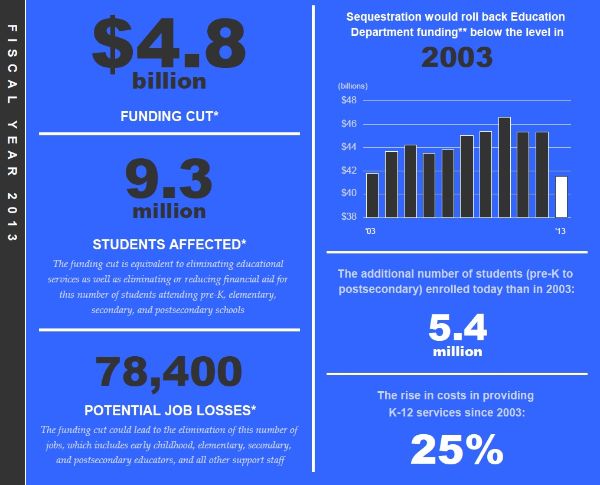Education Groups Most Active in Sequestration Lobbying

Sequestration, a large part of the looming fiscal cliff, conquers economic news. The automatic federal spending cuts, in the absence of a congressional budget, would dig deepest into defense spending. Conventional wisdom would tell you that the defense sector would have the heaviest anti-sequestration lobbying presence. However, the fight against sequestration has seen the largest presence from education lobbying.
According to the Center of Responsive Politics on OpenSecrets.org, the education industry has 91 active organizations in the lobbying process out of 421 total. The defense industry has 25 active lobbying organizations against sequestration.
The federal government has until January 1, 2013 to pass a budget to avoid the fiscal cliff. If not, the mandatory budget cuts entail around $1.4 trillion in reduction in a 10-year period. In that span, defense spending is planned to be reduced by $487 billion. The fiscal year 2013 budget would experience a total reduction of $109 billion, with $4.8 billion coming out of federal education programs, including Head Start. Most of the cuts would come out of federal grants to states for educational operation.
The lobbying presence could be due to the size in numbers within education. While universities are not allowed to establish political action committees, individuals associated with the education institutions are permitted. The 7.6 percent cut to mandatory federal spending and 8.2 percent cut to discretionary spending impacts educational institutions in several ways:
"Universities are worried not only about education funds but also federally funded research programs. Groups like the National Institutes of Health that give out grants are subject to the same cuts."
The National Education Association (NEA) is the largest labor union in the United States accounting for about three million members. NEA Director of Government Relations, Mary Kusler states:
"Sequestration short-changes students, especially students from low-income families and students with special needs. Congress has an obligation to ensure that education funding doesn't fall off a cliff. It's up to Congress to find a balanced solution -- one that doesn't leave America's students out in the cold, left to fend for themselves."
Secretary of Education Arne Duncan testified in front of the Senate Labor, Health and Human Services and Education Appropriations Subcommittee in July. He laid out gritty details including the large number of low-income students who are disproportionately affected by program cuts that contribute to equity. Secretary Duncan concluded:
"While it is absolutely our hope and intention to avoid sequestration, the Department of Education, along with all other agencies, will be ready to implement cuts if sequestration happens. But we all know that there are steps we can take so we don't have to start down this path that puts so many critical services to students, families and communities at risk. As everyone knows, sequestration does not have to happen and should not happen."
A total of 59 separate industries make up the 421 total groups active in sequestration lobbying. Health care professionals have 33 companies lobbying against sequestration. Twenty-eight represent hospitals and nursing and twenty groups represent pharmaceutical companies. The education industry is broader in terms of representation, lending itself well to include more lobbyists in the anti sequestration process. It is unclear at the moment whether or not money spent on lobbying is greater than other industries.
If sequestration comes, it's anticipated to affect over nine million students and cut 78,400 education jobs in its first year. Federal spending on education would be reverted to the levels of 2003, the cost for operation has gone up 25 percent since then.
Credit: nea.orgFor the National Education Association's full report on how sequestration affects education, download the PDF.





